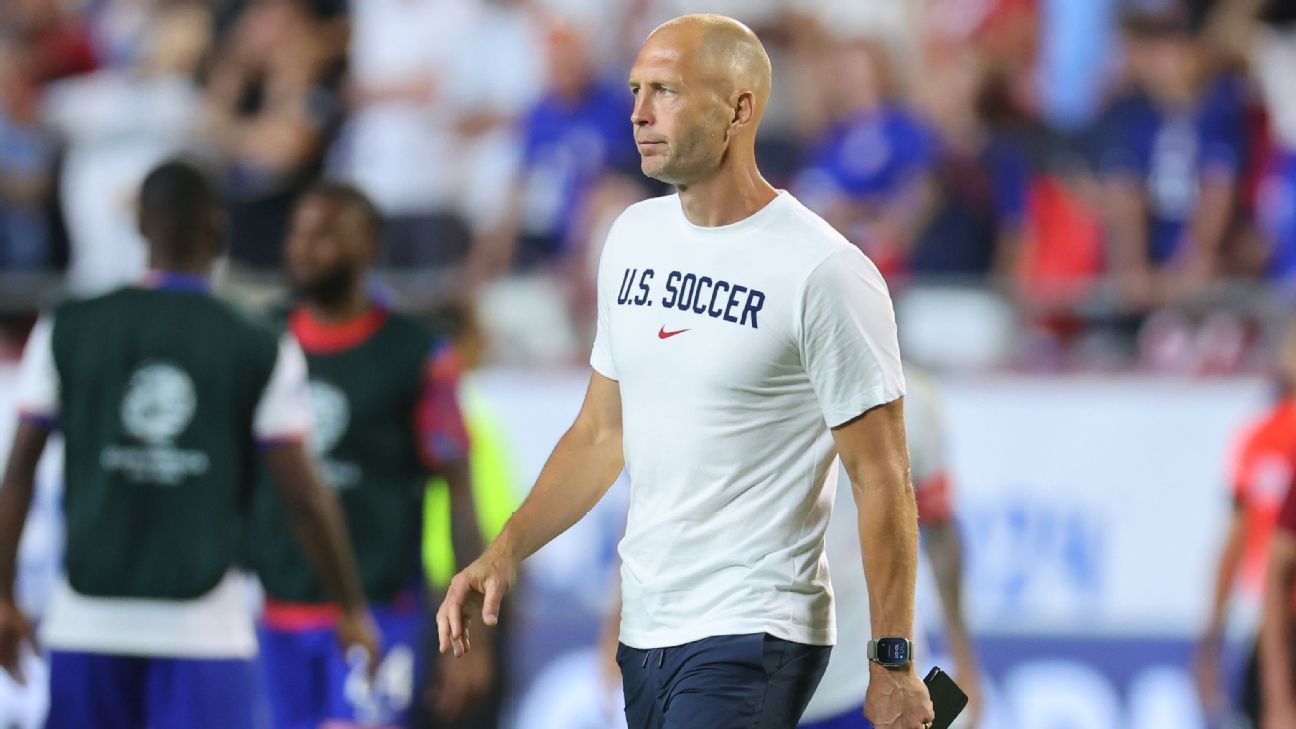KANSAS CITY, Mo. — Gregg Berhalter said he believes he is still the right man to lead the U.S. men's national soccer team despite being eliminated from the 2024 Copa America in the group stage on Monday with a 1-0 loss to Uruguay at Arrowhead Stadium.
The loss, combined with Panama's 3-1 win over Bolivia in a simultaneous match in Orlando, Florida, left the Americans in third place in the group. Uruguay advanced as the winner of Group C, and Panama, which defeated a 10-man U.S. team on Thursday, advanced to the quarterfinals as the second-place team out of the group.
U.S. Soccer Federation sporting director Matt Crocker said in a statement after the game that a review of the team's departure would be conducted.
Asked at his post-match news conference if he was still the right person to lead the U.S. team at the 2026 World Cup, Berhalter responded with a simple “yes.”
However, he admitted that the performances had not been good enough.
“Just seeing the faces of the lads in the dressing room and seeing the emotion of the staff and players, we are bitterly disappointed with the results,” he said. “We know we are capable of more, and in this tournament we didn't show that. It's really that simple.
“If you look at the scenario that was created with the fans at this tournament, with the high level of competition at this tournament, we should have done better. We will do an analysis and find out what went wrong and why it went wrong, but right now it's a feeling of emptiness, for sure.”
Asked whether he should lead the review of the tournament's failure, Berhalter said: “That's not my business.”
Crocker will lead the decision on whether to retain Berhalter.
“Our performance in the tournament did not live up to our expectations. We must do better,” Crocker said in a statement after the loss. “We will conduct a thorough review of our performance at the Copa America and how to improve the team and results ahead of the 2026 World Cup.”
Uruguay scored the winning goal in the 66th minute with a controversial goal from Mathías Olivera. Ronald Araújo headed a free kick that was saved by Matt Turner, who started against Uruguay after leaving Thursday's match with a leg injury.
Olivera was the first player to get to the rebound and appeared to be offside at the time of Araújo's header. But after a lengthy delay, referee Kevin Paolo Ortega pointed to midfield to confirm the goal, much to the chagrin of the American players and much of the crowd.
Bolivia had tied Panama moments earlier, putting the U.S. back in second place in the group in the live standings. Berhalter received the news of Bolivia's equalizer on the bench moments before Uruguay's goal and tried to get a message across to the players just before Uruguay's free kick.
U.S. midfielder Tyler Adams said, “We didn't get eliminated in this game today,” referencing Thursday's loss to Panama as the result that derailed the Americans' efforts in the tournament.
“I don't want to go into a game worried about other results,” Adams said. “The goal should be to win the game. As soon as you start playing for a draw and absorbing pressure, and they start dominating different phases of the game, then you're screwed against a team like that. You don't want to go into games thinking you have to draw or get a point.”
The U.S. national team has never been eliminated in the group stage of a World Cup, Copa America or Gold Cup it has hosted. The U.S. now has a 2-4-3 record against Uruguay.
Berhalter was re-signed in June 2023 and given a contract through the next World Cup, which the U.S. will co-host with Canada and Mexico. But despite fielding a lineup that included Christian Pulisic, Weston McKennie and Adams, the U.S. failed to even match its last Copa America appearance, when it lost to Argentina in the 2016 semifinals.
During the second half of Monday night's game, the home crowd began chanting, “Fire Gregg.”
The players were largely supportive of Berhalter after the match.
“We're all comfortable with Gregg and we understand him; we've had him for a long time,” McKennie said. “He's made the team progress so much further than where we started four or five years ago, and I think the connection we have with him is important, and having a coach, players that would listen to him and would do it through a brick wall.”
“Whatever happens, happens, but I think if he's the coach, we're all happy.”
Adams said not everything that needs change comes “necessarily from the top” and stressed the need for players to handle moments of pressure better.
“I have full confidence in him,” Adams said of Berhalter. “I don't think it's a coach's job in a lot of situations. You know, we set a game plan; the players have to follow the game plan, of course, but at the end of the day you're a footballer. How many times have you played the game?
“You also have to be able to find solutions on the pitch. He has been with us in many difficult moments; I think we will continue to support him as well. I think that is important.”
The United States will play its next friendly matches in September against Canada and New Zealand.
Yunus Musah started in place of the suspended Timothy Weah for the U.S. national team, which meant Giovanni Reyna moved to winger. Weah was ejected early in Thursday's loss to Panama for violent conduct off the ball, and CONMEBOL suspended him for one more game for his actions.
Monday's game at Arrowhead Stadium got off to a rocky start. A frenetic first half was punctuated by 14 total fouls and two injuries that forced substitutions.
Uruguayan winger Maximiliano Araújo left the match on a stretcher in the 27th minute after suffering a bad fall following a collision with an attacking corner kick from Uruguay. He was replaced by Cristian Olivera.
Fourteen minutes later, American forward Folarin Balogun left the field due to an injury after colliding with Uruguayan goalkeeper Sergio Rochet.
Berhalter introduced Josh Sargent and Malik Tillman as attacking options as the U.S. looked for an equalizer, but the Americans finished with just three shots on goal and weren't quick enough to get the ball off their feet inside the 18.
Berhalter referenced expected goals on multiple occasions Monday to back up his claim that the U.S. national team did enough at the Copa America to create opportunities. According to Opta, the Americans created 0.58 expected goals to Uruguay's 1.4.
“I think, again, when you play competitive football, there's very little that separates success from failure,” Berhalter said. “And it only takes one action, it only takes one decision by the referee to get you into trouble.”
“For us, it's important to have that understanding. That understanding that every time we step on the field, there's an impact. And I think we're getting there, but we're not always getting there. And that's something we can improve.”
Information from The Associated Press contributed to this report.












